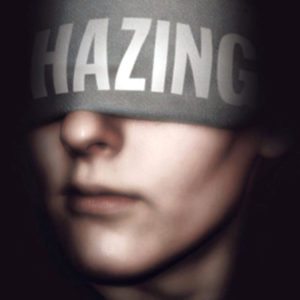Doctors’ Notes
BackHazing
Hazing is defined as “any activity expected of someone joining or participating in a group that humiliates, degrades, abuses, or endangers them, regardless of a person’s willingness to participate.”
 We usually associate hazing with Greek life, but it’s being seen more and more among sports teams, marching bands, military groups, and even honor societies. Students commonly perceive these initiation rituals as harmless fun and group-bonding exercises, but they can progress to downright dangerous behaviors that may even result in fatalities.
We usually associate hazing with Greek life, but it’s being seen more and more among sports teams, marching bands, military groups, and even honor societies. Students commonly perceive these initiation rituals as harmless fun and group-bonding exercises, but they can progress to downright dangerous behaviors that may even result in fatalities.
Many students participate in this unacceptable, high risk, and potentially illegal behavior, because they want to belong to a group and fit in among their peers. Unfortunately, to achieve this, hazing will often subject its victims to extreme embarrassment, physical pain, and/or excessive alcohol consumption.
Numerous news reports covering hazing have shown how detrimental and life threatening young people can be towards each other. Despite hazing being illegal in 44 states, as well as the implementation of anti-hazing efforts by schools across America, these high risk and often life-threatening practices continue. As parents, it’s important for you to educate your children and help them avoid being the victims of hazing — or to prevent them from participating in the hazing of another individual.
What Can Hazing involve?
- Participation in drinking games
- Singing or chanting in public
- Paddling
- Associating with specific people and not others
- Drinking large amounts of alcohol to the point of getting sick or passing out
- Sleep deprivation
- Sexual acts
- Animal cruelty
- Being screamed, yelled at, or cursed at by other members of the group
Who Gets Hazed?
It’s impossible to know how many people are hazed each year, because many episodes go unreported. However, research indicates that hazing continues to be common among middle school, high school, and college students. It’s estimated that nearly 1.5 million high school students are subjected to hazing each year. Roughly half of all incoming college students report having already been hazed. About 90% of students are involved in one of the following groups, which are the most common offenders:
- Varsity Athletics: 75%
- Social Fraternity or Sorority: 74%
- Club Sports: 65%
- Performing Arts Organization: 55%
- Academic Club: 28%
- Honor sSciety: 20%
Why Does Hazing Occur?
Many people justify hazing by proclaiming it to be an effective way to teach respect, discipline, and loyalty. Others consider hazing to be an important rite of passage, or necessary to upholding traditions. Sadly, individuals considered in leaderships or role-model positions are often drivers for hazing activities. Roughly 40 percent of athletic coaches are aware of hazing and allow it to proceed, while about 20 percent of coaches actually participate in hazing of their victims.
Consequences of Hazing
Hazing may attempt to create unity, respect, discipline, and loyalty, but it often has detrimental affects on the mental or physical health of the person being hazed. Each year in the United States, hazing results in death for several unfortunate souls. It’s possible people feel closer to each other after going through hazing, but it can also build animosity between people and destroy trust, unity, respect, and relationships. Common outcomes of hazing include emotional and mental instability, PTSD, decline in academic performance, and loss of interest in the sport/group.
There are also legal consequences to consider for the person committing the hazing. In Pennsylvania, a law states that if you cause, either by force, stress, or deception, someone to commit suicide or other bodily harm, you can be charged with homicide or other crimes. Consent of the victim cannot be used as a defense, because even if the person agreed to participate in the hazing, it may not be true consent because of peer pressure, intentional or unintentional threats, and withholding of information about what is going to occur. If your child hazes another person, that act can result in arrest, suspension/expulsion from school, and/or removal from the team/group/activity.
What Can You Do?
Be educated about what hazing is.
Talk to your child about hazing and its possible dangers, so he or she can be more proactive in maintaining his or her safety.
If your teen is interested in joining a sports team, sorority/fraternity, the marching band, etc, encourage your child to research the organizations he or she is considering carefully.
Encourage your child to look on social media before joining. This may be particularly helpful, as research reports that pictures are posted online in about half of all hazing incidents.
Encourage your child to ask other students about a club before they join it.
Encourage your child to maintain friendships across multiple settings, not just in one particular group or organization.
Inform your child that you are there to listen whenever they need it and are there to support them. Make sure your child understands they can confide in you if something were to happen to them.
Remind your child that suspected hazing can be confidentially reported to campus officials and their identity will be kept anonymous.
Educate your child about the consequences of participating in the hazing of another individual, such as suspension/expulsion from school or sports team, loss of scholarships, and possibly jail time.
If you have questions or concerns, or if you think your child may be participating in hazing activity, you can call us in the office any time. We’re always here to help.
Michael Durkin, PA-C, has been a Kids Plus Provider since 2019.